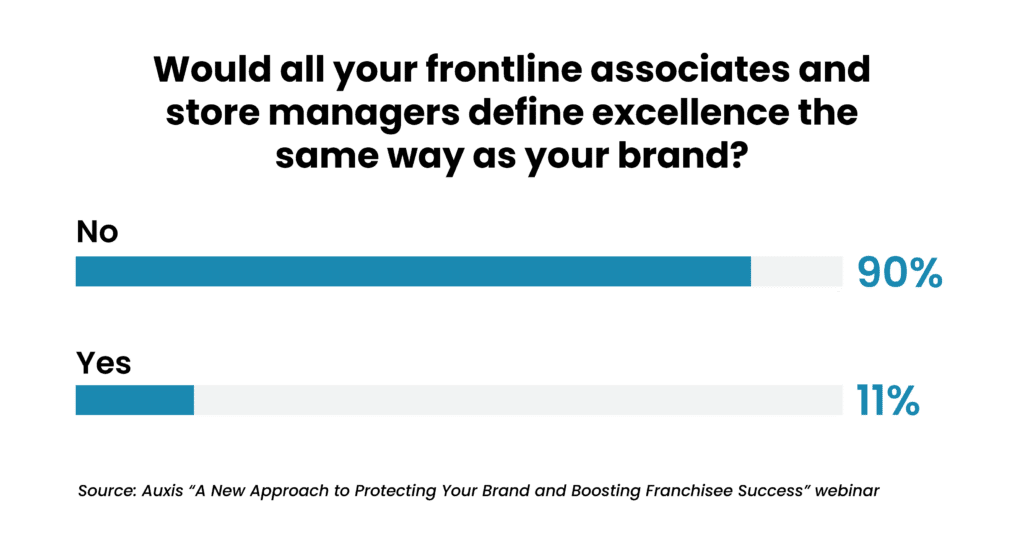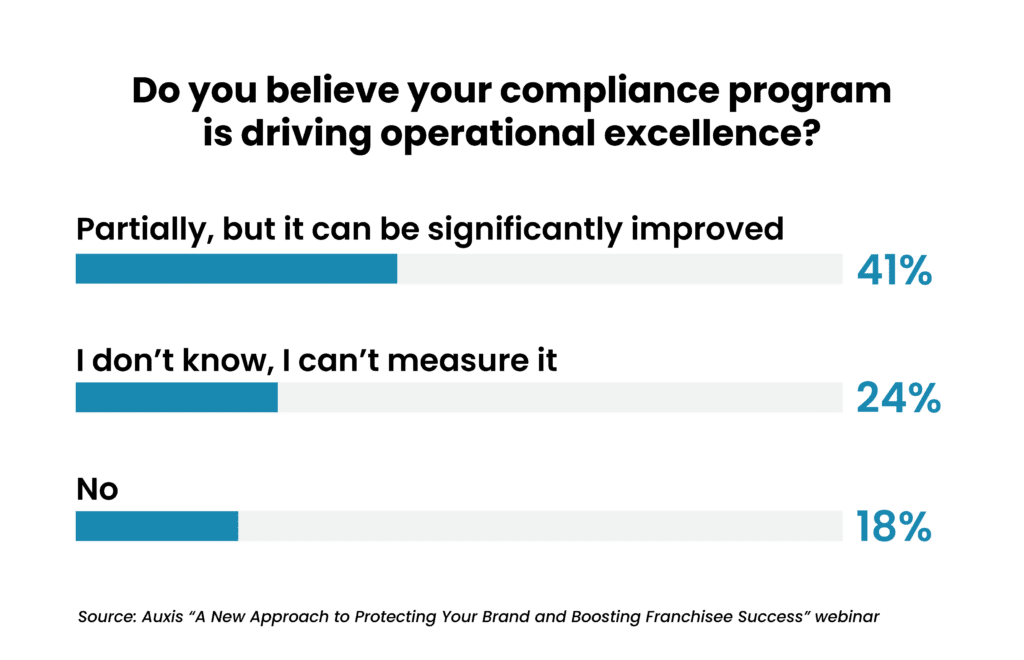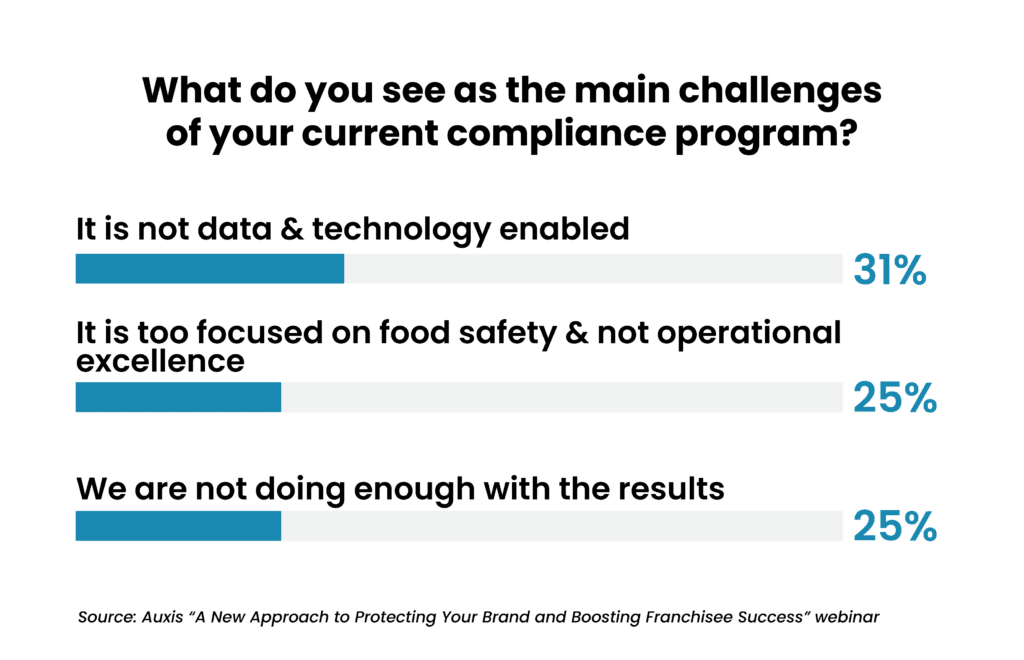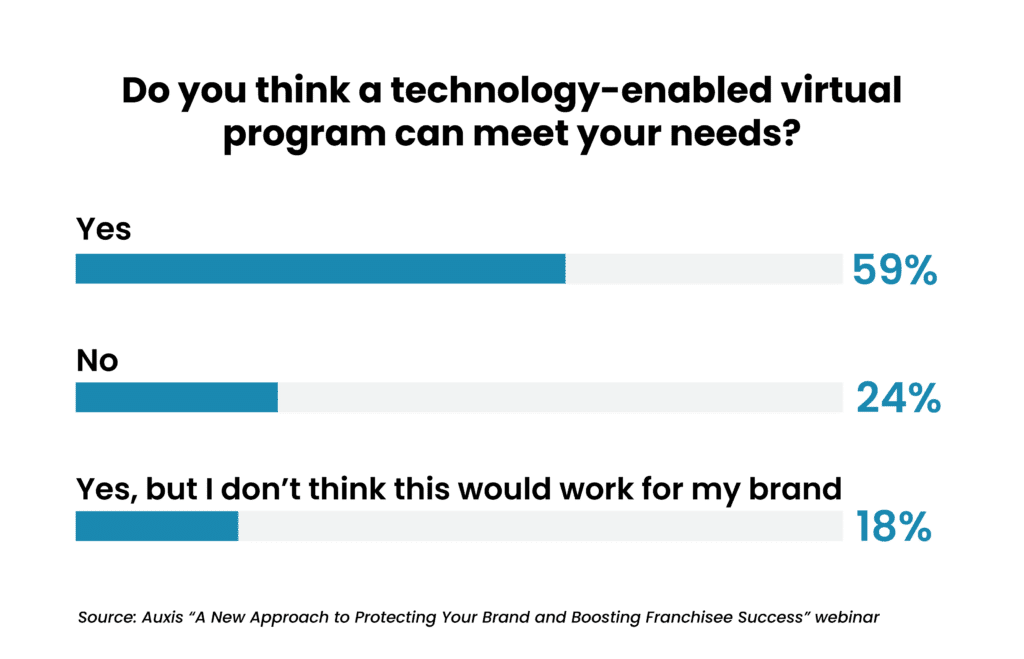In brief:
- 160+ restaurant brand leaders tuned in to hear industry experts discuss strategies for achieving a consistent brand identity that drives loyalty and store success.
- No restaurant operators surveyed believe their brand compliance efforts drive operational excellence.
- Nearly 60% of restaurant leaders said shifting to a tech-enabled brand protection model could provide value to their brand.
- Leveraging new technology and nearshoring solves the critical challenge of how to visit store locations more often, at scale, and at a significantly lower cost.
Some 90% of restaurant brand leaders said their frontline associates and store managers don’t define brand excellence the same way as their brand – a major contributing factor to inconsistent and even poor store-level experiences.
That was a key takeaway from the May 23 webinar sponsored by Auxis and QSR magazine, “Traditional Store Audits are Outdated: A New Approach to Protecting Your Brand and Boosting Franchisee Success.” With more than 160 registrants, the webinar joined together Blaze Pizza CEO Beto Guajardo, Point B Senior Principal Julie Smith, and Auxis Restaurant Leader Keith Sayewitz to discuss how digital innovation is transforming brand protection in the restaurant space – creating a better approach for protecting and sustaining brand integrity across locations, improving store-level performance, and setting up operators and franchisees for success.
To view the full webinar, click here.
Webinar Recap
Traditional Store Audits are Outdated: A New Approach to Protecting Your Brand and Boosting Franchisee Success
Why is brand consistency so important?
Consumers visit restaurant brands with a preconceived notion of what to expect, Smith said. The challenge for brand leaders: shaping that expectation to deliver the most benefit – and ensuring brand recognition is consistent no matter where customers go.
“It is important to have that consistency, to create that common shared definition and taxonomy of brand excellence, because we cannot achieve something we cannot agree on,” Smith said.

Amid more cautionary consumer spending and intense competition, maintaining brand standards is critical to creating dining experiences that increase customer loyalty and revenue. But it’s easy for standards to slip – especially as restaurants confront industry-wide staffing shortages.
Traditionally, restaurants brands have depended upon in-person visits from their area leadership or third-party providers to review operational standards, ensure brand guidelines are met, and provide coaching, support, and feedback.
Here’s the pain: This model is difficult to scale, particularly for chains with thousands of locations worldwide, making it too expensive and logistically impossible for many brands to physically set foot at every store more than once or twice per year. And that’s if they get there at all.
Today’s compliance programs don’t drive operational excellence
With limited time and high costs per audit, many brands neglect the operational side of the review and focus just on food safety. This obviously leaves a critical gap as operators try to enforce brand compliance.
At the Auxis-QSR webinar, not a single brand operator replied “yes” to a poll question asking whether their compliance program drives operational excellence. Instead, 59% answered “no” or “partially, but it can be significantly improved.”
Nearly a quarter said they don’t know how to measure it.

Some brands have attempted to solve these issues by asking stores to perform self-assessments. Typically, however, the resulting data is inconsistent and unreliable – with busy store staff failing to review adequately on their own or incentivized to gloss over issues.
“Coaching a store manager to be a great hospitality deliverer or a great manager to employees – you can’t get that out of a manual,” said Blaze Pizza’s Guajardo. “You get it because the coach has a great coach.”
Failing to provide meaningful coaching or explore store-level growth opportunities leaves frontline workers with little insight into the best way to achieve consistent execution of brand compliance guidelines. The traditional “surprise” audit model also fosters a less supportive relationship between store employees and operational staff – highlighting failures instead of ensuring consistent execution.
“Imagine you are a store manager and every time someone comes into your store from corporate or field operations it feels like it’s that ‘gotcha’ moment,” Guajardo said. “When you visit your stores more frequently, you build the expectation that ‘you are here to help me do something better,’ and not ‘you’re doing something wrong.’ It changes the game.”
Frequent audits vs. surprise audits: What’s the better approach?
Fortunately, like any legacy process, modernization offers a better solution for ensuring ideal brand experiences, food safety, and product quality no matter where customers go. Merging the power of digital innovation with the advantages of nearshore outsourcing, the rise of virtual audit and brand protection services is solving the critical challenge of how to visit store locations more often, at scale, and at the lowest cost per audit in the industry.

“A better model than the surprise visit is the frequent visit. When you visit your stores at a regular cadence, everyone is always on their game because they know someone is always coming to check.”
– Keith Sayewitz, Auxis Restaurant Vertical Leader
During virtual audits, dedicated teams trained to your brand’s standards leverage new technology to conduct virtual walk-throughs of store operations – evaluating brand assets, food handling and preparation, cleanliness, speed of service, and other essential areas.
Leveraging nearshore brand compliance solutions in Latin America delivers top-tier talent while eliminating travel expenses and high U.S. labor costs associated with in-person models. Brand audits are customized to meet the needs of specific brands, restaurant models, and the overall restaurant industry – with full evaluation reports and real-time analytics that close performance gaps.
The result: increased store touches drive better control of brand standards, which leads to higher revenue and customer loyalty. Improving brand experiences also decreases operator churn due to unsuccessful franchised stores.
“It’s a real shift, leveraging what is available in the market today that wasn’t five or 10 years ago,” Sayewitz said. “There’s a stat we put in a lot of our materials: 73% of consumers say they will abandon a brand after just a single bad experience. We all want to do everything we can to ensure the kind of consistent customer experiences that drive loyalty.”
Changing the game for iconic brands in the QSR space
Guajardo detailed how Auxis’ pioneering model led to a significant spike in customer satisfaction and revenue when he served as president of international for a leading multi-brand quick-service restaurant operator.
Store visits increased from about 150 to more than 7,000 per year. Auxis also provided coaches who were fluent across eight foreign languages including Russian and Arabic – a critical necessity since many international store managers do not speak English, Guajardo said.
With consistent visits and quality coaching, the QSR brand’s virtually audited stores grew comparable sales by more than 10% compared to stores that did not participate in the program, Guajardo said. Read the detailed case study here.

“Bringing the analytics and humanity together underneath the technology that enables this to work was a game-changer for us. This program isn’t just going to change your company; this is something that is going to change the entire industry.”
– Beto Guajardo, Blaze Pizza CEO
Guajardo added that virtual brand audits further elevate the role of brands’ operational staff, enabling them to focus on higher-value work like solving issues proactively.
“Area managers often find themselves doing quality control audits. That’s an expensive visit to check the temperature of the fridge, as opposed to having them talk about business strategy or how to drive demand into the store,” Guajardo said.
Consistent data lets you grow without replicating past challenges
The data from digitally enabled audits becomes a powerful tool for decision-making. Too often, restaurant brands audit different criteria in different regions, failing to identify trends and create a comprehensive picture of their stores, Sayewitz explained.
Consistent measurement is fundamental to effective brand audits, repeating the same assessment at every location to generate usable data across critical categories that define an ideal customer experience. Typically, that includes dining area, marketing, product quality, kitchen, food safety, crew members, and store exterior.
A quarter of restaurant operators at the Auxis-QSR webinar said the inability to leverage data stands as the biggest challenge as they struggle to maintain brand consistency, according to polling results. Most respondents ranked lack of data and technology enablement as their compliance program’s biggest deficiency.

“When data is based on a consistent SOP and a consistent definition of excellence, it always offers the same view of how operations are being executed,” Sayewitz said. “The power of that data enables regional leadership to make decisions based on facts, not anecdotes.”
Nearly 60% of restaurant brand leaders at the webinar said shifting to a tech-enabled virtual brand protection model could provide value to their brand.

“There are so many opportunities to improve the way we serve customers and show up with consistency daily. We are all going to be challenged to think about how we can use technology to do this more effectively and efficiently,” Smith said.

“The ability to see across stores, ownership models, and geographies with consistency is a huge unlock to help your store-level performance rise. You can grow with confidence that you aren’t replicating the challenges of the past but building upon a platform of success.”
– Julie Smith, Point B Senior Principal
View the full “A New Approach to Protecting Your Brand and Boosting Franchisee Success” webinar to hear more insights from our panel of restaurant industry leaders!
Ready to learn more about virtual audit and brand protection services? Schedule a consultation with our Restaurant Services team today! You can also visit our resource center for more restaurant industry tips, strategies, and success stories.


